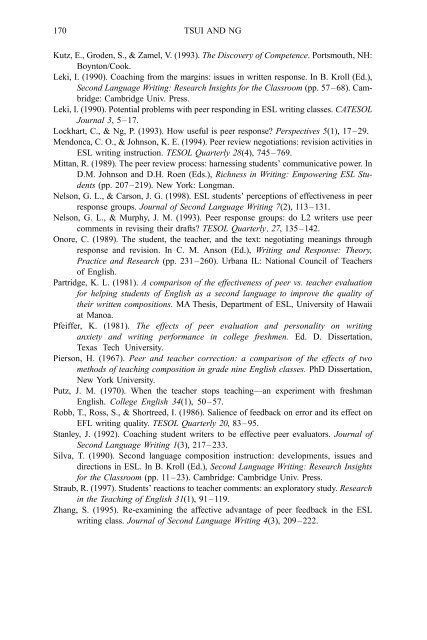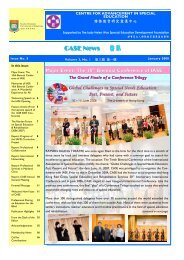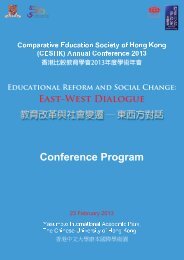Do Secondary L2 Writers Benefit from Peer Comments?
Do Secondary L2 Writers Benefit from Peer Comments?
Do Secondary L2 Writers Benefit from Peer Comments?
Create successful ePaper yourself
Turn your PDF publications into a flip-book with our unique Google optimized e-Paper software.
170 TSUI AND NG<br />
Kutz, E., Groden, S., & Zamel, V. (1993). The Discovery of Competence. Portsmouth, NH:<br />
Boynton/Cook.<br />
Leki, I. (1990). Coaching <strong>from</strong> the margins: issues in written response. In B. Kroll (Ed.),<br />
Second Language Writing: Research Insights for the Classroom (pp. 57±68). Cambridge:<br />
Cambridge Univ. Press.<br />
Leki, I. (1990). Potential problems with peer responding in ESL writing classes. CATESOL<br />
Journal 3, 5±17.<br />
Lockhart, C., & Ng, P. (1993). How useful is peer response? Perspectives 5(1), 17±29.<br />
Mendonca, C. O., & Johnson, K. E. (1994). <strong>Peer</strong> review negotiations: revision activities in<br />
ESL writing instruction. TESOL Quarterly 28(4), 745±769.<br />
Mittan, R. (1989). The peer review process: harnessing students' communicative power. In<br />
D.M. Johnson and D.H. Roen (Eds.), Richness in Writing: Empowering ESL Students<br />
(pp. 207±219). New York: Longman.<br />
Nelson, G. L., & Carson, J. G. (1998). ESL students' perceptions of effectiveness in peer<br />
response groups. Journal of Second Language Writing 7(2), 113±131.<br />
Nelson, G. L., & Murphy, J. M. (1993). <strong>Peer</strong> response groups: do <strong>L2</strong> writers use peer<br />
comments in revising their drafts? TESOL Quarterly, 27, 135±142.<br />
Onore, C. (1989). The student, the teacher, and the text: negotiating meanings through<br />
response and revision. In C. M. Anson (Ed.), Writing and Response: Theory,<br />
Practice and Research (pp. 231±260). Urbana IL: National Council of Teachers<br />
of English.<br />
Partridge, K. L. (1981). A comparison of the effectiveness of peer vs. teacher evaluation<br />
for helping students of English as a second language to improve the quality of<br />
their written compositions. MA Thesis, Department of ESL, University of Hawaii<br />
at Manoa.<br />
Pfeiffer, K. (1981). The effects of peer evaluation and personality on writing<br />
anxiety and writing performance in college freshmen. Ed. D. Dissertation,<br />
Texas Tech University.<br />
Pierson, H. (1967). <strong>Peer</strong> and teacher correction: a comparison of the effects of two<br />
methods of teaching composition in grade nine English classes. PhD Dissertation,<br />
New York University.<br />
Putz, J. M. (1970). When the teacher stops teachingÐan experiment with freshman<br />
English. College English 34(1), 50±57.<br />
Robb, T., Ross, S., & Shortreed, I. (1986). Salience of feedback on error and its effect on<br />
EFL writing quality. TESOL Quarterly 20, 83±95.<br />
Stanley, J. (1992). Coaching student writers to be effective peer evaluators. Journal of<br />
Second Language Writing 1(3), 217±233.<br />
Silva, T. (1990). Second language composition instruction: developments, issues and<br />
directions in ESL. In B. Kroll (Ed.), Second Language Writing: Research Insights<br />
for the Classroom (pp. 11±23). Cambridge: Cambridge Univ. Press.<br />
Straub, R. (1997). Students' reactions to teacher comments: an exploratory study. Research<br />
in the Teaching of English 31(1), 91±119.<br />
Zhang, S. (1995). Re-examining the affective advantage of peer feedback in the ESL<br />
writing class. Journal of Second Language Writing 4(3), 209±222.

















